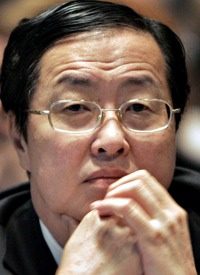
Japanese Financial Services Minister Shozaburo Jimi confirmed that China’s central bank governor Zhou Xiaochuan had not defected to the United States, something rumored from Chinese-based sources for several days over the weekend. But the question now being asked is why the rumor started in the first place.
According to STRATFOR, a private global news and intelligence advisory group, the “rumors appear to have started following reports on Aug. 28 which cited Ming Pao, a Hong Kong-based news agency, saying that because of an approximately $430 billion loss on U.S. Treasury bonds, the Chinese government may punish some individuals within the PBC, including Zhou.” But the alleged $430 billion loss appears to be as fictitious as Zhou’s defection to the United States.
The rumor may have been a result of a Communist Party leadership political hit on Zhou, who was one of the last top political operatives who have retained his position from the last administration of President Jiang Zemin. According to STRATFOR, “Zhou was rumored to be under ‘shuanggui,’ a form of house arrest administered by the CPC, during the massive crackdown of Shanghai Party Secretary Chen Liangyu in 2006, which was perceived in the country as a crackdown of the Shanghai Gang and part of President Hu Jintao’s effort to consolidate power ahead of the 2007 power transition.”
STRATFOR, which circulated the rumor in the United States, has stressed that “STRATFOR has received no confirmation of the rumor, and reports by state-run Chinese media appeared to send strong indications that Zhou is in no trouble at the moment.”
China will be choosing a new President in 2012, as current President Hu Jintao will no longer be eligible for reelection under China’s 1982 constitution. The rumor could be seen as a means of political jockeying in advance of the election. Had the Chinese defection been genuine, the fiscal policy impact on the United States could have been enormous. China is currently America’s largest foreign creditor, and until recent months was the largest buyer of U.S. federal government debt securities.
Photo of Zhou Xiaochuan: AP Images



